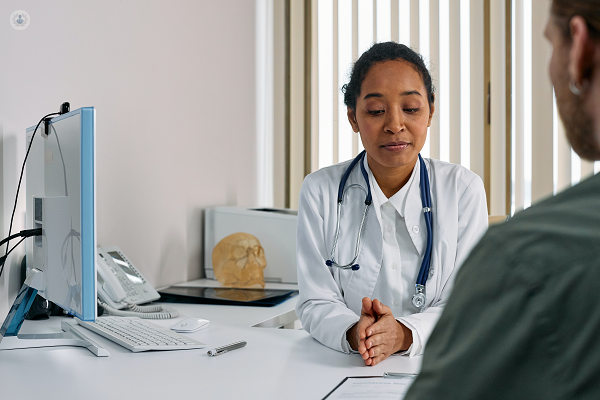Considering getting a second medical opinion? Find out more about the process
Written by:It's becoming more and more common to obtain a second medical opinion. It may be easy to consult the Internet but the confusion it can create means that a qualified and experienced specialist's expert advice is invaluable for your wellbeing and peace of mind.
Here to explain how to go about it through proper channels is Mr G. Michael Hess, a leading orthopaedic spinal surgeon who specialises in second opinions.

What does it mean to get a second medical opinion?
Getting a second medical opinion is; if you've seen a consultant specialist and they suggest an invasive treatment or surgery, for example. Then you go to see another specialist to see if they suggest the same treatment or something else.
Is it common to seek a second medical opinion? Why is it important to do so?
It's getting increasingly frequent to ask another doctor for a second medical opinion. The Internet, I have to say, doesn't help that much. I see more and more patients who are confused. They look on various websites and they say, “Well, I've heard so many different opinions that it wasn't really helpful. I have this recommendation to have this treatment, or that surgery, and I want to speak to another doctor to see if they see it in the same way."
There are, frequently, different ways to look at one specific disease or complaints that patients have. There's often more than one solution, and often this is discussed, especially when it comes to surgery, in multidisciplinary team meetings (MDT). However, in my opinion it's discussed, more or less, what [resources and capabilities] this specific group has available. It's probably not likely that a patient is referred outside for a treatment that isn’t offered within this group. This is perhaps why, going to someone else, to another specialist, may be very helpful.
Under what circumstances would you recommend seeking a second opinion?
You should seek a second medical opinion, probably whenever a surgery has been suggested. Of course, there are surgical indications when there is numbness or weakness in your extremities and the surgery has to be done urgently and quickly, so there's no time to consult with another specialist. However, whenever it's about degenerative wear and tear issues, and there's more chronic pain, there's clearly time to do another consultation and ask for another opinion. Frequently there are other options that could be tried before major surgery.
How do I discuss this with my current doctor?
That is a difficult question. I think you should tell them very openly and you will also need X-rays or an MRI to show to the other consultant. I think the best way is to also ask them;
- "Well, would another doctor or another specialist, tell me the same thing?";
- "Are there any other options?";
- "What would you think if I go to another specialist, or could you even recommend someone?"
I think you could do that.
How will the new doctor assess my condition?
When I have patients who come for a second opinion, I usually don't want to know what the other doctor has said, at the beginning. I don't even want to read the reports. I start from scratch. I talk to the patient, get their history, do an exam, have a look at the MRI. I don't want to be biased.
For patients, my advice is:
Don't tell the consultant: "I have been recommended to undergo this or that surgery", so just tell them "I'm here for a second opinion".
Then I usually start from the beginning. I don't want to be influenced, and this is what patients want. They do want an unbiased opinion. This is very important, so frequently I see patients who have a recommendation for spinal surgery or intervention.
Just a few days ago I saw an 80-year-old lady, she was sent to me for her back pain and left leg pain. Of course, at 80 there's some wear and tear, and there were some findings indicating that there is a bit of leg pain caused by narrowing of the spinal canal and pinched nerves.
When I spoke to her, she said several times: "Well I do have a lot of pain in the groin." When I examined her, the hip joint on that side was very stiff and I could hardly move the leg. It caused immediate pain. I sent her for an X-ray that hadn't been done before; she'd only had an MRI of the spine twice and no-one had examined her hip.
There was severe hip osteoarthritis and yes, while the spine wasn't okay, I told her: "It's not 100 per cent the hip, but this is what causes most of your symptoms. You need to have a hip replacement and then we'll see and follow up what other symptoms are left. Then we'll see if there's something we need to do for the spine. But the hip is the main problem."
This is why you need to have someone for a second opinion, to consult with a specialist who thinks out of the box and who isn’t biased. The best thing would to consult with someone who doesn't even offer this specific recommended surgery. They're a specialist, but they don't do that themselves. They don't even have a financial interest. They're completely unbiased. That is my advice.
If you’re looking for an expert second medical opinion regarding orthopaedic spinal issues, Mr Hess can help. Visit his Top Doctors profile to discover how to arrange an appointment with him.


